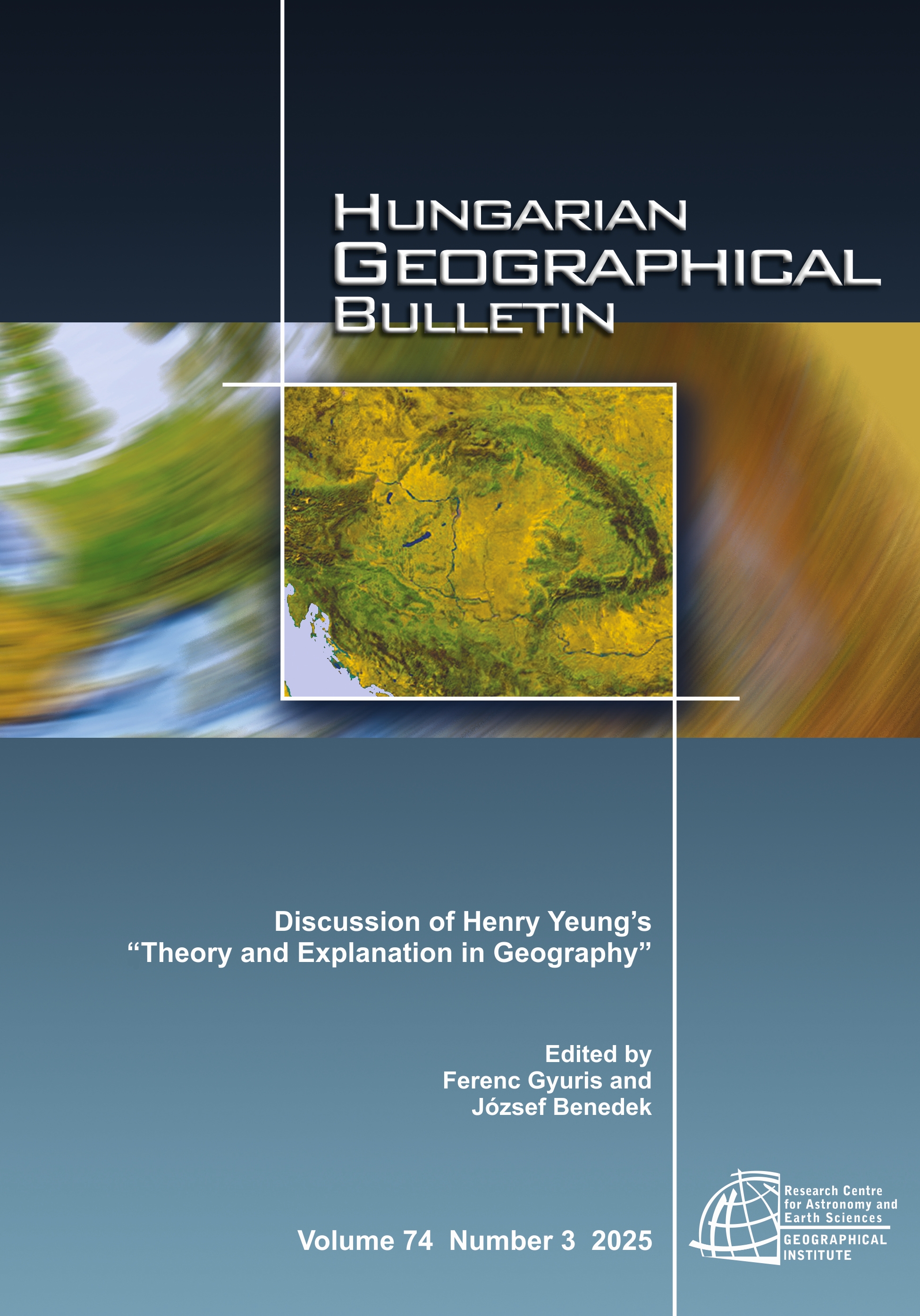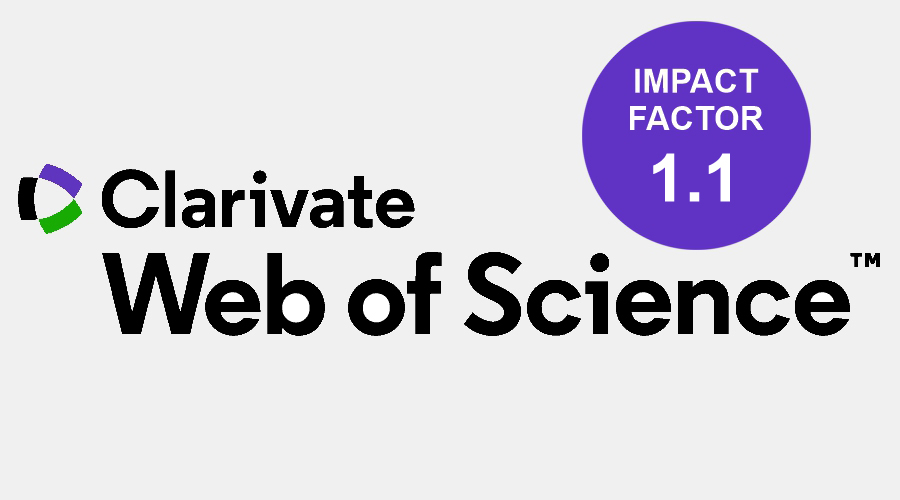Context as ontology and epistemic infrastructure: Rethinking explanation in economic geography
Abstract
This paper clarifies how mechanism-based explanation can work in economic geography when digital spatial methods are routine. We outline a critical realist orientation that treats socio-spatial context in two linked ways: as an ontological condition that enables or constrains causal powers, and as an epistemic infrastructure that organises the categories through which mechanisms become visible. On this basis, explanation involves specifying mechanisms, scope conditions, and likely empirical traces, while attending to how data systems shape what can be observed. We illustrate the approach with two short cases from Romania. First, spatial models of COVID-19 vaccine uptake identify clustering and diffusion, but explanation arises only when these patterns are situated within a layered health regime shaped by socialist legacies, market reforms, and transnational guidance. Second, typologies of peri-urban change derived from demographic and satellite data are read as traces of spatial figurations generated by property restitution, fragmented planning, and capital flows. In both cases, the same variables can sustain divergent ontological commitments: mechanisms treated as regularities, or mechanisms identified as generative structures with stated conditions of activation. The paper’s contribution is practical. It offers a clear statement of the framework, two heuristic illustrations that connect patterns to mechanisms, and a set of design suggestions: state mechanisms and scope before methods; use digital tools to locate and evaluate traces rather than to stand in for mechanisms; combine quantitative outputs with institutional and historical evidence; and document the fit of travelling categories to regional ontologies. We do not claim to settle the debate. Our aim is to show how explanation can proceed in a way that is transparent about assumptions and proportional in its claims. Viewed this way, the paper provides a tractable starting point for cumulative, comparative, theory-building research in and beyond Central and Eastern Europe.
References
ARRIBAS‐BEL, D. and READES, J. 2018. Geography and computers: Past, present, and future. Geography Compass 12. (10): e12403. https://doi.org/10.1111/gec3.12403
ASH, J., KITCHIN, R. and LESZCZYNSKI, A. 2018. Digital turn, digital geographies? Progress in Human Geography 42. (1): 25–43. https://doi.org/10.1177/0309132516664800
BALLAND, P.-A., BOSCHMA, R., CRESPO, J. and RIGBY, D.L. 2019. Smart specialization policy in the European Union: Relatedness, knowledge complexity and regional diversification. Regional Studies 53. (9): 1252–1268. https://doi.org/10.1080/00343404.2018.1437900
BARNES, T.J. and CHRISTOPHERS, B. 2018. Economic Geography: A Critical Introduction. Hoboken, NJ, Wiley Blackwell.
BHASKAR, R. 1975. A Realist Theory of Science. York, Books.
BHASKAR, R. 1979. The Possibility of Naturalism: A Philosophical Critique of the Contemporary Human Sciences. Atlantic Highlands, NJ, Humanities Press.
BOSCHMA, R.A. and FRENKEN, K. 2006. Why is economic geography not an evolutionary science? Towards an evolutionary economic geography. Journal of Economic Geography 6. (3): 273–302. https://doi.org/10.1093/jeg/lbi022
BOSCHMA, R.A. and MARTIN, R. (eds.). 2010. The Handbook of Evolutionary Economic Geography. Cheltenham, UK–Northampton, MA, Edward Elgar. https://doi.org/10.4337/9781849806497
CLARK, G.L., FELDMAN, M.P., GERTLER, M.S., WÓJCIK, D. and KAISER, A. (eds.) 2018. The New Oxford Handbook of Economic Geography. Oxford, Oxford University Press. https://doi.org/10.1093/oxfordhb/9780198755609.001.0001
CRESPI, F. and QUATRARO, F. (eds.) 2015. The Economics of Knowledge, Innovation and Systemic Technology Policy. London–New York, Routledge. https://doi.org/10.4324/9780203795071
DALTON, C.M. and THATCHER, J. 2015. Inflated granularity: Spatial “Big Data” and geodemographics. Big Data & Society 2. (2): 1–15. https://doi.org/10.1177/2053951715601144
DODGSON, M., GANN, D. and PHILLIPS, N. (eds.). 2014. The Oxford Handbook of Innovation Management. Oxford, UK, Oxford University Press. https://doi.org/10.1093/oxfordhb/9780199694945.001.0001
ELSTER, J. 2015. Explaining Social Behaviour: More Nuts and Bolts for the Social Sciences. Cambridge, UK, Cambridge University Press. https://doi.org/10.1017/CBO9781107763111
GLASMEIER, A.K. and FARRIGAN, T.L. 2007. Landscapes of inequality: Spatial segregation, economic isolation, and contingent residential locations. Economic Geography 83. (3): 221–229. https://doi.org/10.1111/j.1944-8287.2007.tb00352.x
GOODCHILD, M.F. 2007. Citizens as sensors: The world of volunteered geography. GeoJournal 69. (4): 211–221. https://doi.org/10.1007/s10708-007-9111-y
GRUBBAUER, M. and KUSIAK, J. 2012. Chasing Warsaw: Socio-material Dynamics of Urban Change Since 1990. Frankfurt–New York, Campus-Verlag.
HARVEY, D. 1969. Explanation in Geography. London, Edward Arnold.
HEDSTRÖM, P. and SWEDBERG, R. (eds.). 1998. Social Mechanisms: An Analytical Approach to Social Theory. Cambridge, UK, Cambridge University Press. https://doi.org/10.1017/CBO9780511663901
HIRT, S.A. 2012. Iron Curtains: Gates, Suburbs and Privatization of Space in the Post-Socialist City. Chichester, Wiley Blackwell. https://doi.org/10.1002/9781118295922
JESSOP, B. and SUM, N.-L. 2022. Cultural political economy. In Handbook of Alternative Theories of Political Economy. Eds.: STILWELL, F., PRIMROSE, D. and THORNTON, T., Cheltenham, Edward Elgar Publishing, 355–370. https://doi.org/10.4337/9781789909067.00034
JOHNSTON, R. (ed.) 1992. The Dictionary of Human Geography. Oxford, Blackwell.
KINOSSIAN, N. 2022. Rethinking the post-socialist city. Urban Geography 43. (8): 1240–1251. https://doi.org/10.1080/02723638.2022.2102332
KITCHIN, R. 2014. The Data Revolution: Big Data, Open Data, Data Infrastructures & Their Consequences. London, SAGE. https://doi.org/10.4135/9781473909472
KITCHIN, R. 2022. The Data Revolution: A Critical Analysis of Big Data, Open Data & Data Infrastructures. Los Angeles–London–New Delhi–Singapore–Washington D. C.–Melbourne, SAGE.
LIVINGSTONE, D.N. and WITHERS, C.W.J. 2011. Geographies of Nineteenth-Century Science. Chicago, University of Chicago Press. https://doi.org/10.7208/chicago/9780226487298.001.0001
LIVINGSTONE, D.N. 2013. Putting Science in its Place: Geographies of Scientific Knowledge. Chicago, The University of Chicago Press.
LYNCH, M. 2022. Data Lives: How Data Are Made and Shape Our World: Rob Kitchin. Bristol, UK, Bristol University Press. https://doi.org/10.1080/2325548X.2022.2036546
MACLEAVY, J. 2019. Mechanism, process and the wider context of economic geography. Dialogues in Human Geography 9. (3): 273–279. https://doi.org/10.1177/2043820619875332
MARE, C., BELBE, S. and PETROVICI, N. 2024. Exploring the spatial clustering and spill-over effects of COVID-19 vaccination uptake in Romania: An analysis at municipality level. AStA Advances in Statistical Analysis Online publication. https://doi.org/10.1007/s10182-024-00520-3
MCELROY, E. and CHELCEA, L. 2025. Who’s afraid of post-socialist theory? Eurasian Geography and Economics 66. (6): 719–731. https://doi.org/10.1080/15387216.2025.2510352
MEUSBURGER, P., HEFFERNAN, M. and SUARSANA, L. (eds.) 2018. Geographies of the University. Cham, Springer International Publishing. https://doi.org/10.1007/978-3-319-75593-9
MÜLLER, M. 2019. Goodbye, Post-socialism! Europe-Asia Studies 71. (4): 533–550. https://doi.org/10.1080/09668136.2019.1578337
NAGY, E. 2025. Post-socialism: Still here? Eurasian Geography and Economics 66. (6): 689–696. https://doi.org/10.1080/15387216.2025.2510354
PAASI, A. 2025. Geopolitics of knowledge. In The Wiley Blackwell Companion to Political Geography. Eds.: MAMADOUH, V., KOCH, N., WOON, C.Y. and AGNEW, J., Chichester, Wiley Blackwell, 56–72. https://doi.org/10.1002/9781119753995.ch4
PETROVICI, N. 2012. Workers and the city: Rethinking the geographies of power in post-socialist urbanisation. Urban Studies 49. (11): 2377–2397. https://doi.org/10.1177/0042098011428175
PETROVICI, N., BELBE, S., MARE, C. and COTOI, C. 2023. Hybrid health regimes: Access to primary care physicians and COVID-19 vaccine uptake across municipalities in Romania. Social Science & Medicine 337. 116305. https://doi.org/10.1016/j.socscimed.2023.116305
PETROVICI, N. and POENARU, F. 2025. Uneven and divergent spatial figurations: A five-pronged typology of urban and periurban formations in Romania. Cities 156. (5): 105578. https://doi.org/10.1016/j.cities.2024.105578
PICKLES, J. (ed.) 1995. Ground Truth: The Social Implications of Geographic Information Systems. New York, NY, Guilford Press.
PICKLES, J. 2010. The spirit of post-socialism: Common spaces and the production of diversity. European Urban and Regional Studies 17. (2): 127–140. https://doi.org/10.1177/0969776409356492
PRATT, A.C. 1995. Putting critical realism to work: The practical implications for geographical research. Progress in Human Geography 19. (1): 61–74. https://doi.org/10.1177/030913259501900104
PUCHEROVÁ, D. and GÁFRIK, R. (eds.) 2015. Postcolonial Europe? Essays on Post-Communist Literatures and Cultures. Leiden–Boston, Brill Rodopi. https://doi.org/10.1163/9789004303850
RODRÍGUEZ-POSE, A. 2021. Costs, incentives, and institutions in bridging evolutionary economic geography and global production networks. Regional Studies 55. (6): 1011–1014. https://doi.org/10.1080/00343404.2021.1914833
SANDU, A. 2024. The post-socialist cities from Central and Eastern Europe: Between spatial growth and demographic decline. Urban Studies 61. (5): 821–833. https://doi.org/10.1177/00420980231189261
SAYER, R.A. 1984, 1992. Method in Social Science: A Realist Approach. Abingdon, UK, Taylor & Francis. https://doi.org/10.4324/9780203310762
SAYER, A. 2002, 2010. Method in Social Science: A Realist Approach. Revised second edition. London, Routledge. https://doi.org/10.4324/9780203850374
SCHUURMAN, N. 2000. Trouble in the heartland: GIS and its critics in the 1990s. Progress in Human Geography 24. (4): 569–590. https://doi.org/10.1191/030913200100189111
SHELTON, T., POORTHUIS, A. and ZOOK, M. 2015. Social media and the city: Rethinking urban socio-spatial inequality using user-generated geographic information. Landscape and Urban Planning 142. 198–211. https://doi.org/10.1016/j.landurbplan.2015.02.020
SHELTON, T. 2024. Challenging opacity, embracing fuzziness: Geographical thought and praxis in a post-truth age. Dialogues in Human Geography 14. (2): 352–356. https://doi.org/10.1177/20438206231157891
SMITH, A. and TIMÁR, J. 2010. Uneven transformations: Space, economy and society 20 years after the collapse of state socialism. European Urban and Regional Studies 17. (2): 115–126. https://doi.org/10.1177/0969776409358245
SOJA, E.W. 1980. The socio-spatial dialectic. Annals of the Association of American Geographers 70. (2): 207–225. https://doi.org/10.1111/j.1467-8306.1980.tb01308.x
STENNING, A. 2005. Where is the post-socialist working class? Working-class lives in the spaces of (post-)socialism. Sociology 39. (5): 983–999. https://doi.org/10.1177/0038038505058382
THATCHER, J., O’SULLIVAN, D. and MAHMOUDI, D. 2016. Data colonialism through accumulation by dispossession: New metaphors for daily data. Environment and Planning D: Society and Space 34. (6): 990–1006. https://doi.org/10.1177/0263775816633195
WISNER, B. 1978. Does radical geography lack an approach to environmental relations? Antipode 10. (1): 84–95. https://doi.org/10.1111/j.1467-8330.1978.tb00298.x
WYLY, E. 2011. Positively radical. International Journal of Urban and Regional Research 35. (5): 889–912. https://doi.org/10.1111/j.1468-2427.2011.01047.x
YEUNG, H.W. 1997. Critical realism and realist research in human geography: A method or a philosophy in search of a method? Progress in Human Geography 21. (1): 51–74. https://doi.org/10.1191/030913297668207944
YEUNG, H.W. 2019. Rethinking mechanism and process in the geographical analysis of uneven development. Dialogues in Human Geography 9. (3): 226–255. https://doi.org/10.1177/2043820619861861
YEUNG, H.W. (ed.) 2023. Theory and Explanation in Geography. Chichester, Wiley. https://doi.org/10.1002/9781119845515
Copyright (c) 2025 József Benedek, Andreea Țoiu

This work is licensed under a Creative Commons Attribution-NonCommercial-NoDerivatives 4.0 International License.






